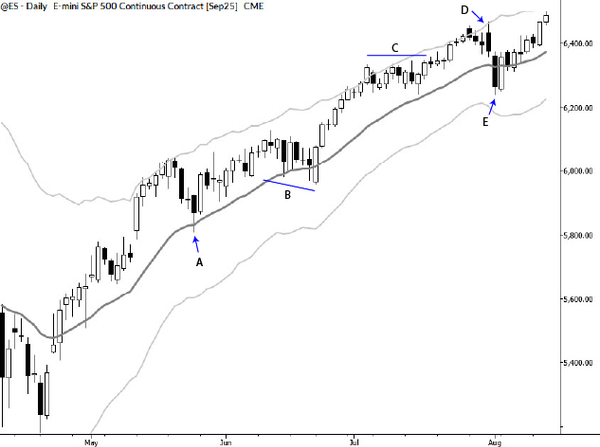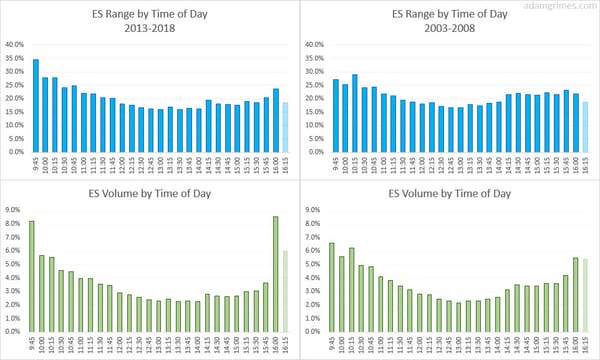Trading macro events and reports (part I)
There are so many things we can't predict; surprises, good and bad, happen. Sometimes these surprises can have a dramatic impact on our positions. One of the core tasks of trading is to respond to new developments and shifts in the market, but it's also important to do what we can do reduce the number of surprises. Too many times, developing traders are hit by things they could and should have seen coming.

First of all, what are these "events"? Broadly speaking they are things you can put on your calendar weeks in advance. Some examples:
- Earnings releases for specific stocks
- Earnings releases for important competitors of stocks you hold
- Pre-announced press releases for stocks you trade
- Scheduled economic reports (e.g., Philly Fed, Jobless Claims, GDP, etc.)
- Meetings of central banks ( and he FOMC nonsense probably should get its own line here.)
- Crop reports, etc. for commodities you trade
Now, it's important to avoid hindsight bias here. We can't predict what the outcome of those events will be, so don't kick yourself after the fact for not "knowing" stock ABC was going to beat or that the Fed would make some "obvious" change in language that would send stocks higher. That's another game, if you choose to play it; all we're concerned about here is knowing when these events are going to hit the market and have some impact--we don't know what impact--on prices.
There's a second group of things that are a little harder to manage. These are events that will probably happen at some unscheduled time in the future: could be in the next five minutes, could be next month, but we don't know the exact timing. Some examples might be:
- Resolution of a pending legal matter for a specific company (lawsuit, etc.)
- Legislation that might have an impact on a company or a sector
- Approval or denial of a patent, new drug, etc.
- Unscheduled (rumored) announcement of a new product, or new business line from a company you follow
- Resolution of geopolitical events or other macro event
These events are more complicated because of timing, but I'm going to suggest you handle all of these things in more or less the same way. With any "outside" (exogenous) event, I think there are two broad ways to handle it. One of these ways is not right or better than the other, but you need to understand what, exactly, you are doing.
Forecasting events
First, you can attempt to predict the outcome of these events. Should you have been able to see that the drug would be approved by the FDA? Should you have been able to see that country A would send tanks over the border of country B, disrupting the flow of commodity C? Should you have known that the crop fields were getting more water than people generally think so the crop report would be a positive surprise? Maybe.
In each of these cases, there are deep specialists who make a living out of predicting the outcomes. I would gently suggest, if you are finding the subject of this blog interesting, that's probably not you--over the years, I have seen far too many people try to do this kind of work without the proper background. Do you have access to data that is not generally available, and the expertise to understand it? Is there some reason why you should be able to have an edge over everyone else who might be looking at the same thing?
It's difficult because it's easy to see after the fact (hindsight bias is crushing), and you might not realize how difficult some of these ideas can be to implement, even if you are correct. If you want to go down this rabbit hole, it might be worthwhile spending a decade or so apprenticed to someone who does this sort of thing well. Your edge is not going to come from reading books, listening to news, social media, thinking, formal education, or any other obvious source--it's going to be the result of putting together a lot of things with a good dose of market wisdom. That's not easy to do.
But, put this in perspective: this is not bad news; it is a warning to respect how complicated the process of forecasting events is. If you choose to go this route, you are committing to building some serious expertise. Furthermore, even if you correctly forecast the event, the market impact may not be what you expect. (More on that in a future blog post this week.)
Managing events
For most traders, there is a simpler way to deal with these event: understand that they will bring volatility and risk into the market. These events are scheduled, so you know when additional volatility will be coming into the market, and the question becomes what will you do with this information? The most realistic way to think about these events is that they will be random shocks: "I know this thing is going to happen at this time, and I know that it will probably move markets around a lot. I do not know which direction, so it may be good or bad for me." So, what do you do about this?
I can give you my answers, but you will need to adapt them to your own situation. For me, the right answer is usually to reduce or exit positions in advance of events that I think might move markets. In some cases, particularly if I hold substantial profits, I may do nothing at all, but at least I know what is coming around the corner. At least, I know.
Of course, there are surprises--some events fizzle, and some events have unexpected market impact. That is ok, and my job is to manage the impact of those events in all cases. What is absolutely unacceptable, though, is getting hit by a scheduled event I did not know about. Scheduled earnings, central bank meetings, releases of economic numbers--I may well choose to do nothing before these events, but at least I know they are coming. That is part of being an educated market participant, and getting blindsided by a scheduled event should never happen.
I'll follow up this week with a post on some of the execution challenges in these "fast markets", and what types of information may lead in advance. Sometimes markets tip their hand, and maybe we can make use of that information in setting up trades and managing risk.



